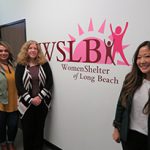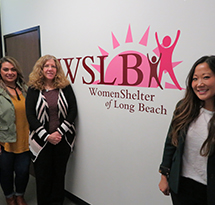It is a story that is all too familiar for the staffers at WomenShelter of Long Beach (WSLB): A domestic violence survivor seeks help physically escaping her abuser, but has trouble legally freeing herself.
LAFLA started the Adopt-a-Shelter program in 2018 to reach more domestic violence survivors, and provide critical legal help. Our attorneys hold monthly clinics at local shelters across Greater Los Angeles, and offer clients legal advice, retain cases for representation, and give referrals. As Staff Attorney Justine Schneeweis notes, “Getting to a LAFLA office or a courthouse to get a restraining order or legal advice can be very intimidating. It’s very beneficial to have a clinic where domestic violence victims are already comfortable.”
One WSLB client, who had been in an abusive relationship for 10 years, found the courage to obtain a restraining order after attending one of the monthly clinics staffed by Justine. According to WSLB Legal Advocate Yvonne Reyes (pictured above, left), “The client felt like the pressure had finally lifted off her chest, and said she’s not turning back. The help that LAFLA provides is huge for [the clients]. It encourages them to keep moving forward.”
Every month, Justine has a full schedule of WSLB clients who seek her expertise: “The high participation rate speaks to the high value of this program,” said WSLB Associate Director Tatiana Dorman (pictured above, right). “It’s comforting for clients to have a person who is respectful, and connects with them and talks them through difficult legalese.”
LAFLA attorneys not only guide clients through family law-related topics, like restraining orders, divorce, and custody; but they also help with other legal matters, including immigration-related issues. Many clients are undocumented victims of domestic violence who are trying to obtain immigration status. “I’ve advised several clients that they may be eligible for a U visa, which is for victims of serious crimes (such as domestic violence) in the U.S., who were helpful in a law enforcement investigation into that crime,” said Justine. “I advised them of the evidence and supporting documentation they should start collecting so that they can start the process of a U visa case.” Clients can also receive help for issues such as renters’ rights and public assistance—reflective of the wide scope of LAFLA’S full services.
The Adopt-a-Shelter program also empowers shelter staff and others who work with domestic violence survivors: “Having that relationship with a shelter gives staffers the opportunity to learn more about the legal issues impacting their residents,” said Dominique Quevedo, Managing Attorney of LAFLA’s Supporting Families Workgroup. “We also provide presentations on family law and our domestic violence work, and train staff on how to ultimately better address their clients’ unique needs.”
LAFLA has helped thousands of women and men leave abusive relationships, and runs three domestic violence clinics in Downtown Los Angeles, Long Beach, and Santa Monica—as well as various other clinics throughout the Greater Los Angeles region. As part of our mission, LAFLA works extensively with communities to educate providers and clients about the law, and ensure vulnerable people can access legal help.
The success of the Adopt-a-Shelter model—with LAFLA coming directly to organizations—is testament to the power of collaborative community efforts: “This can help clients break their ties to their abuser, so they don’t have to see him or her in court. They can say, I’m on my own, I can start healing, and I’m in a safe spot. That’s huge to them,” said WSLB Executive Director Mary Ellen Mitchell (pictured above, center).
We are grateful to all of our partner organizations in the Adopt-a-Shelter program:
- Su Casa
- WomenShelter Long Beach
- Upward Bound
- Alexandria House
For more information on LAFLA’s work with domestic violent survivors, please visit our website. If you seek legal help from LAFLA, please call our help line at 800-399-4529 between 9 a.m. and 5 p.m., or visit one of our offices, domestic violence clinics, or self-help centers.

